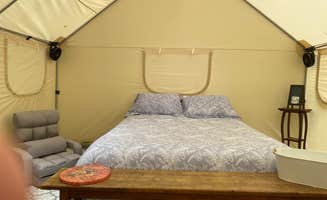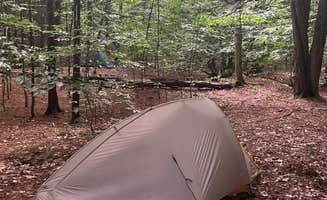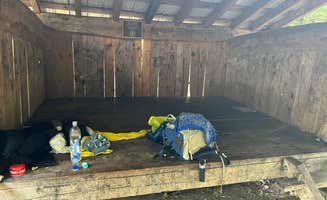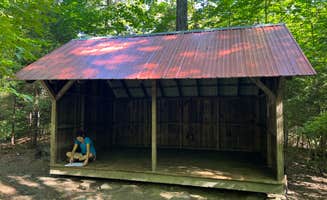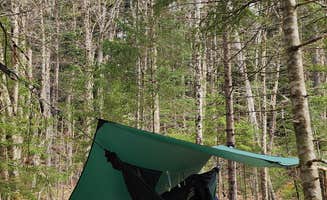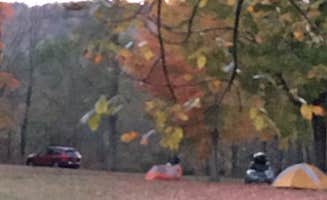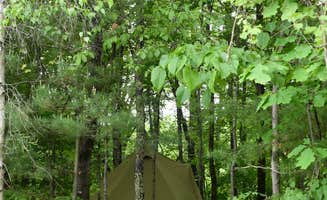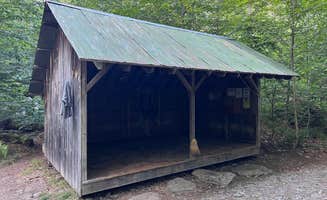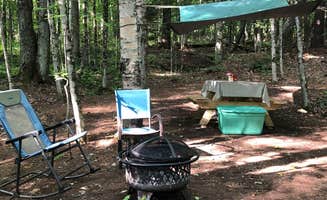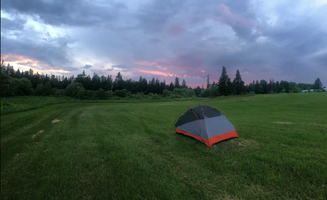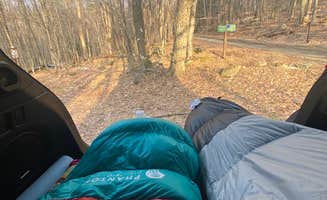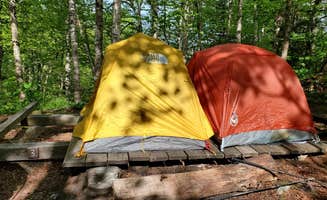Vershire, Vermont serves as a gateway to the Appalachian National Scenic Trail with several backcountry camping options at elevations ranging from 1,000 to 2,000 feet. The region experiences cold winters with temperatures often below freezing and moderate summers with highs rarely exceeding 85°F. Seasonal water availability varies significantly throughout the year, with most reliable sources present during spring months.
What to do
Hiking at Moose Mountain: Access the Appalachian Trail section near Moose Mountain Backcountry Shelter, which offers a scenic overlook for tent campers. "The shelter did stand out with a bench overlooking a clearing in the brush with a view which was a great place to enjoy my freeze dried dinner," notes a backpacker who stayed at the site.
Fishing opportunities: Several streams near Green Mountain National Forest FR25 provide seasonal fishing. "Gorgeous stream/river...love the river sounds," comments a camper who appreciated the water access at this dispersed camping area approximately 20 miles west of Vershire.
Bird watching: Early morning hours at Happy Hill Backcountry Shelter provide opportunities to observe forest birds in their natural habitat. One tent camper noted: "This was a great place to stop along the Appalachian Trail" with "beautiful surrounding forest" offering ample wildlife viewing opportunities.
What campers like
Shelter lofts: The double-decker shelter design at Happy Hill offers unique sleeping arrangements. A backpacker explains: "The shelter had a ground floor and a loft but each floor could maybe fit 4-5 people comfortably... The loft was nice since folks could decide to sleep up there while others were down below, either cooking, arriving, or departing."
Privacy between sites: Many tent camping areas provide reasonable separation between sites. At Velvet Rocks Shelter, hikers found "some slightly slanted spots around the main shelter area" for setting up tents with adequate distance from other campers.
Well-maintained facilities: Several backcountry shelters feature newer outhouses. One camper at Moose Mountain remarked: "The privvy was also new and very spacious," making it stand out among Appalachian Trail facilities in the region.
What you should know
Water availability challenges: Many water sources near Vershire are seasonal and unreliable. A camper at Trapper John Backcountry Campground reported: "There is a water source in the area but it did not have water when I visited (probably on account of the drought)," highlighting the importance of carrying additional water during dry periods.
Site limitations: Terrain constraints affect tent placement options at some locations. At Thistle Hill, a hiker mentioned: "it seemed to have smaller spots for tent camping that were somewhat sloped," indicating the need for careful site selection.
Security concerns: At Green Mountain National Forest FR25, campers should take precautions with valuables. One visitor warned: "Make sure to lock your valuables. Our Jackery, Solar panels & toilet were stolen," suggesting extra vigilance at dispersed sites with less oversight.
Tips for camping with families
Site selection: Choose areas with level tent platforms when camping with children. Thistle Hill Backcountry Shelter provides a standard shelter with adjacent tent spots, though one camper notes these are "somewhat sloped," making site selection important for family comfort.
Shorter access routes: For families with young children, consider sites with shorter approach hikes. Velvet Rocks Shelter has relatively accessible tent camping compared to other AT shelters, though it remains "100% long hike in with no guaranteed water and a basic privvy."
Weather preparation: Pack additional layers even in summer months due to significant day-night temperature fluctuations. The region's higher elevations can experience overnight lows below 50°F even in July and August.
Tips from RVers
Limited access: Most camping near Vershire is not suitable for RVs. At Green Mountain National Forest FR25, a visitor noted there are "6 to 8 sites, approximately, but I didn't go down a couple little gravel paths to check each spot as you couldn't turn around easily," highlighting challenges for larger vehicles.
Forest road conditions: FR25 access roads may become difficult after rain. Several campers mentioned moisture issues, with one stating, "Beautiful sites on the River but with the wet summer, we just couldn't dry out," suggesting caution when planning RV access during rainy periods.
Site availability: Arrive early to secure spots at dispersed camping areas. "Friday night had the whole place to ourselves. Saturday night all spots filled," reported one camper, indicating weekend competition for limited spaces appropriate for smaller recreational vehicles.


